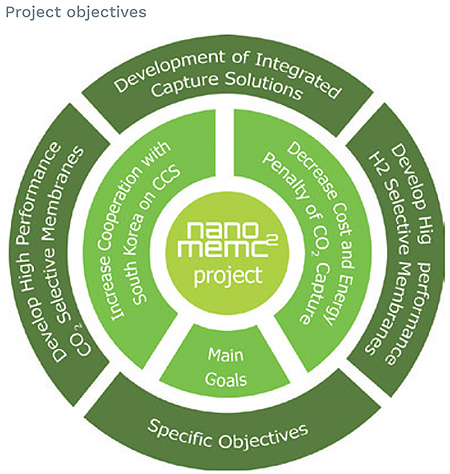Within the current environmental concerns about global warming, Carbon Capture, Utilisation and Storage (CCUS) is seen as a necessary medium-term technology to reduce greenhouse gas emissions into the atmosphere while waiting for a complete transition towards a more sustainable energy system.
Currently, the main downside to the application of carbon capture (CC) technologies is the high implementation cost; therefore, strong research efforts are required to optimize current capture processes and make CC an economically viable solution for the decarbonisation of industry.
The NANOMEMC2 project aims to overcome such limitations through the development of CO2 capture innovative materials, membranes and processes which are able to achieve a substantial cost reduction, and help achieve the reduction of CO2 emissions.
To that aim NANOMEMC2 applies new membranes to both Pre- and Post-combustion capture stages in order to increase the flexibility of the proposed solutions and maximize the resulting technologies’ chances of success. NANOMEMC2 also addresses the development of new, high efficiency capture processes, which are selected through techno-economic and environmental analysis, to obtain solutions tailored for a competitive implementation of membrane-based capture applications in relevant industrial plants.
The above targets are being validated during the project, in suitable industrial environments, to build a solid business case for the future deployment of membrane-based carbon capture solutions in industry.
Finally, NANOMEMC2 seeks strong collaboration with the Republic of Korea in the field of CCS to exploit complementary expertise and synergies in the development of new capture solutions.
During the project, different types of nanofillers based on cellulose nanofibers or graphene and graphene oxide have been analised so as to understand their ability to boost the separation performance of conventional membranes materials with interesting CO2 capture capabilities.
Two main families of membranes were investigated, the so-called Facilitated Transport Hybrid Membranes (FTHM) which separate the CO2 through a selective carrier mediated transport mechanism, and the Continuous Phase Hybrid Membranes, which mainly exploit the molecular sieve mechanism to separate CO2 from other gases. More than 50 1st generation and about 30 2nd generation materials have been produced and tested, most of which are very close to or above the Robeson's upper limit which is usually applied to compare membranes separation performances.

Most promising 1st generation materials have already been tested in the Colacem cement production facility in Gubbio (Italy). The results were very interesting and made it possible to obtain lab scale permeability data in an industrial environment. A hollow fiber module of the 2nd generation materials is now being prepared by the consortium for the second industrial experimental campaign, while new 3rd generation membranes based on modified nanocellulose and graphene are being tested at labscale to prepare the basis for further advance in membrane based carbon capture applications.
In parallel with the experimental analysis, a number of modelling tests were made on both materials and processes.
For the designs of new materials, modelling processes were produced by focusing on the development of micro and macro-scopic tools for transport membranes.
This work led to the development of plans for membranes integration within various areas of activity where CCUS applications can be applied, such as:
- Power generation from natural gas
- Power generation by coal gasification
- Clinker production (Cement)
- Hydrogen production via steam methane reforming
During the first half of the project, both the "Business As Usual" case, without any carbon capture, and the "Base Case", applying state-of-the-art CCS technologies, were evaluated for benchmarking purposes. The last year was devoted to the analysis of different process schemes for the implementation of NANOMEMC2 membranes. Current results are satisfactory, especially so in pre-combustion capture, where pressure is available as a driving force for membranes separation.
LCA analysis of the different processes is ongoing. Applications in new areas of interest, such as biogas upgrading are also being considered.
Following the successful technical development, an Industrial Workshop will be organised in Brussels next 11th of April 2019. The event will aim to disseminate information on the findings from the project and how the technology could contribute towards industrail decarbonisation. Moreover,within the framework of Topic LCE-24-2016 "International Cooperation with South Korea on new generation high-efficiency capture processes", the three European Commission funded projects: NANOMEMC2, GRAMOFON, and ROLINCAP will organize a third EU-South Korea joint workshop on "New generation high-efficiency capture processes". This workshop will be held in Paris on the 2nd and 3rd of July 2019. Stakeholders will get an overview of the current status and development of the three projects and their collaboration with Korean partners. Industrial and scientific experts will be invited to share their view on CCS. Register on NanoMEMC2 website to get updates on the event and its final agenda.

The project is still in progress and will run up to next September 2019. Up to now, NANOMEMC2 has obtained a broad range of promising results for the development of membrane-based CC solutions. Most of the materials investigated showed properties in line or above the current permeability/selectivity trade off limit for CO2 separation membranes and were successfully tested in relevant industrial environments. In addition, techno-economic analysis on optimized integrated processes showed that such membranes can be competitive with other CC technology in reducing the overall cost of the capture stage in different industrial applications.
NANOMEMC2 is a project funded by the European Commission. This project has received funding from the European Union's Horizon 2020 Research and Innovation program under Grant Agreement n° 727734